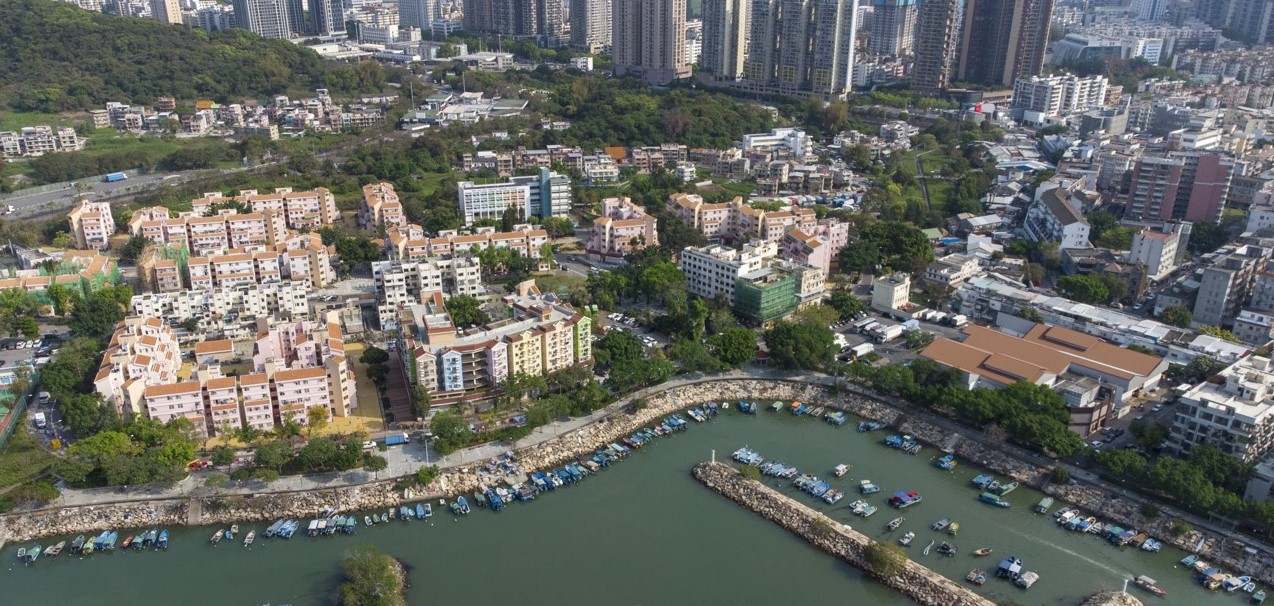Hong Kong, 29 November 2023: The most isolated settlement in the world is Tristan da Cunha, a group of volcanic islands in the South Atlantic Ocean. Home to around 240 hardy souls who rely on farming to sustain their slow-paced lifestyle, the only way to get there is a six-day boat trip from Cape Town. Tristan da Cunha is so remote, it has yet to record a Covid case.
While hardly in the same league, the secluded town of Sha Tau Kok – tucked away in the furthest northeast corner of Hong Kong’s New Territories, on the border with Shenzhen – is still pretty difficult to visit. The train journey and subsequent minibus ride are straightforward enough, but you need an entry permit to gain admission.
Why? Because Sha Tau Kok is one of the last remaining settlements in the Frontier Closed Area, a buffer zone running the length of the border between Hong Kong and Shenzhen set up by the British authorities in 1951 to deter illegal immigrants and smugglers. While the off-limits area, now effectively redundant, has been greatly reduced in stages since 2008 – at 400 hectares, it is barely one-seventh of its original size – it is still subject to regulation. Hence, Sha Tau Kok, home to some 4,000 residents who require a permit to live there, has remained closed to most outsiders.
This, however, is changing. Since June last year, tour agencies have been granted limited access to the town as part of a pilot scheme to promote cultural and eco-tourism. Some 36,000 individuals have since visited as part of tour groups. From January, the project is being expanded to allow individual visitors, supported by an online platform for permit applications, with the daily quota doubled to 1,000. The permits will allow travellers to remain in the town from 7:00am to 9:00pm, although access to fabled Chung Ying Street, which is shared by the Hong Kong and Shenzhen authorities and where local residents can cross freely from one side to the other, will remain restricted.
Tourism chiefs are hopeful the scheme will give Sha Tau Kok a much-needed boost. Local Rural Committee Chairman Lee Koon-hung points out that the town has an ageing population, with many young citizens having moved away for better opportunities, and he describes its current state as “bleak”. Ray Chu of the Association for Sha Tau Kok Culture and Ecology is another enthusiast, insisting the area has much to offer: “There are so many marine parks, country parks and geoparks that nobody has ever visited or appreciated.”
What the visitor programme can do for Sha Tau Kok, however, pales in comparison to the potential impact of the Northern Metropolis. This is our government’s hugely ambitious plan to help solve Hong Kong’s chronic housing shortage and further integrate with Shenzhen by creating an entire new city along the border. Covering some 30,000 hectares, the Northern Metropolis will be home to 2.5 million people and create half a million jobs, many of them in innovation and technology. Sha Tau Kok, at its eastern edge, is expected to see a surge in property prices in the coming years.
Chief Executive John Lee has unveiled further details of the mega-project in his latest policy address and promises it will be suitable for flourishing communities: “We will make sure people’s livelihood will be improved.” He is hardly wasting time. His administration’s Northern Metropolis Co-ordination Office, only established in June, has already published its action agenda, which calls for town planning to be completed by the end of next year. After that, the development will proceed at breakneck speed. Co-ordination Office head Vic Yau is certain the Northern Metropolis will be a significant contributor to the city’s housing supply in the long-term.
Short-term, however, the challenges are huge, with some 220,000 citizens living in subdivided flats and a six-year waiting list for public housing. So, it is interesting to read this week that nearly 60 public sector households have been found to own private flats in a probe by government officials designed to crack down on abuse of the system. Permanent Secretary for Housing Rosanna Law warns that “deliberate failure to submit declaration forms or intentional concealment will result in the immediate termination of the lease agreement”.
In related news that should surprise nobody, health checks on more than 400 families in subdivided units have found that half show warning signs for chronic diseases. The statistics come to light thanks to a Jockey Club and Chinese University community outreach scheme to provide free health screening and guidance to citizens living in such accommodation. Project co-ordinator Professor Eliza Wong points out that adequate space “is crucial for their physical and mental health development”.
Cramped living conditions? Chinese astronaut Wang Yaping knows all about those, having spent six months on board the Tiangong space station in 2021. Now she has just touched down in Hong Kong as part of a delegation from the China Manned Space Agency. She wants our city’s youth to dream big and reach for the stars – “if you work hard, you can definitely touch them” – while Space Agency Deputy Director Lin Xiqiang hopes to one day see a Hong Kong astronaut, adding that his organisation has identified several candidates.
Clearly, many Hong Kong residents are heading for our northern border. A select few, however, are seeking the final frontier.
Until next time, everybody!
Colin Cohen
Senior Partner
Boase Cohen & Collins



